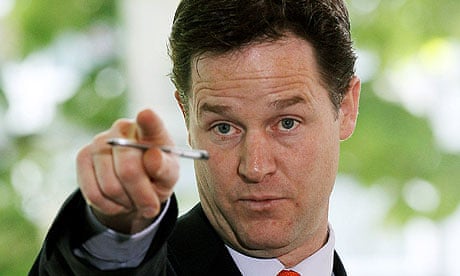Finns now have the legal right to broadband access, as a law passed in October comes into force today. Under the law, telecomms providers are obliged to offer always-on high-speed internet connections to all of the country's 5.3 million citizens, with a minimum speed of at least 1 megabit per second.
It makes an interesting contrast with the UK – where Nick Clegg's announcement of the "Your Freedom" project, aiming to repeal laws seen as onerous or unnecessary came with a new website where people can suggest laws that they want repealed. Basically, a bonfire of the inanities.
And one of the first laws that got put up there by annoyed citizens as a candidate for repeal? The Digital Economy Act, passed in the "wash-up" period at the fag-end of the last Parliament, opposed then by the Liberal Democrats (in particular Don Foster) and the occasion for his first-ever revolt by Labour MP and former Cabinet Office minister Tom Watson.
Indeed, Clegg himself called during the election for the DEA to be repealed. Can't see his name in the comments. Yet.
The contrast between Finland and the UK could not be more stark. Where Finland is treating broadband as being essential to its infrastructure, the DEA offers the potential for strictures where people could, in theory, be cut off if they are judged to have broken copyright law. (The Labour government insisted that this would only happen in the most extreme of cases, and there is no mention in the Act of any "three strikes" methodology, but the threat still remains. It's just a question of process.)
Finland, of course, has good reason to want to make sure that all its citizens can get broadband. They're not solely about high-tech. It's also because Finland has some incredibly rural areas, as well as its cities. And it gets extremely cold in winter, which means that it's preferable to stay where you are than to travel long distances to work, if your work can be done via a computer.
Partly for that reason, Finland is already one of the world's most connected countries, with 96% of citizens online - but in October the communications minister, Suvi Linden, said that the mandate was necessary in order to improve the availability of internet in Finland's remote rural areas. In an announcement in September, Ms Linden committed to making 100Mb internet access - one hundred times faster than the connections mandated under the current law - available to all Finnish residents by 2015.
In the UK, the government is aiming at 2Mbps for 99% of the population by 2012 - but there's no law to back it. Jeremy Hunt, the secretary of state at the Department of Culture, Media and Sport, declared early in June that he wants the UK to have the best superfast broadband network in Europe: "We are now ranked 33rd in the world when it comes to broadband speed, with an average that is nearly five times slower than South Korea", he said. "Within this parliament we want Britain to have the best superfast broadband network in Europe."
Unfortunately we're miles behind in that race, and without any legal force to make telecomms companies provide that sort of connectivity, and no clear subsidy to encourage them to connect the rural areas (which are most expensive to wire, and produce the lowest return, because you have few customers far apart, compared to cities where you have many customers close together) it looks like we're going to continue to lag.
Even so, we can be hopeful about the DEA. It would be interesting if the Lib Dem arm of the coalition manages to get the DEA repealed. As sheredom, who suggested it for the bonfire, pointed out, the reasons for killing it are:
"1. Misguided bill that will not combat the issues that it claims to. Puts unnecessary strain on ISPs that do not wish to enforce the law; 2. To stand up to these lobby groups and say 'No, we are not going to do things because big business tells us to.'"

Comments (…)
Sign in or create your Guardian account to join the discussion